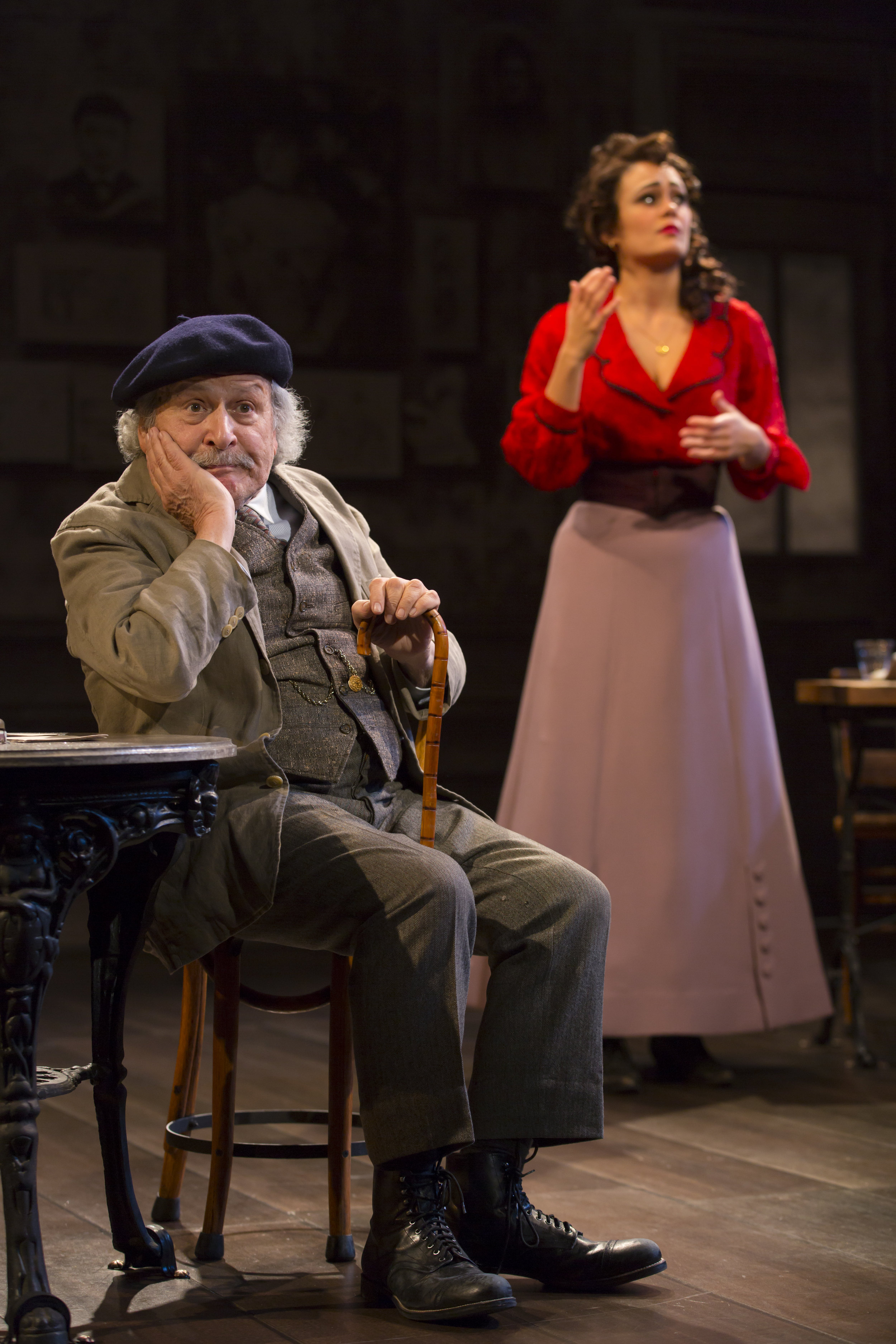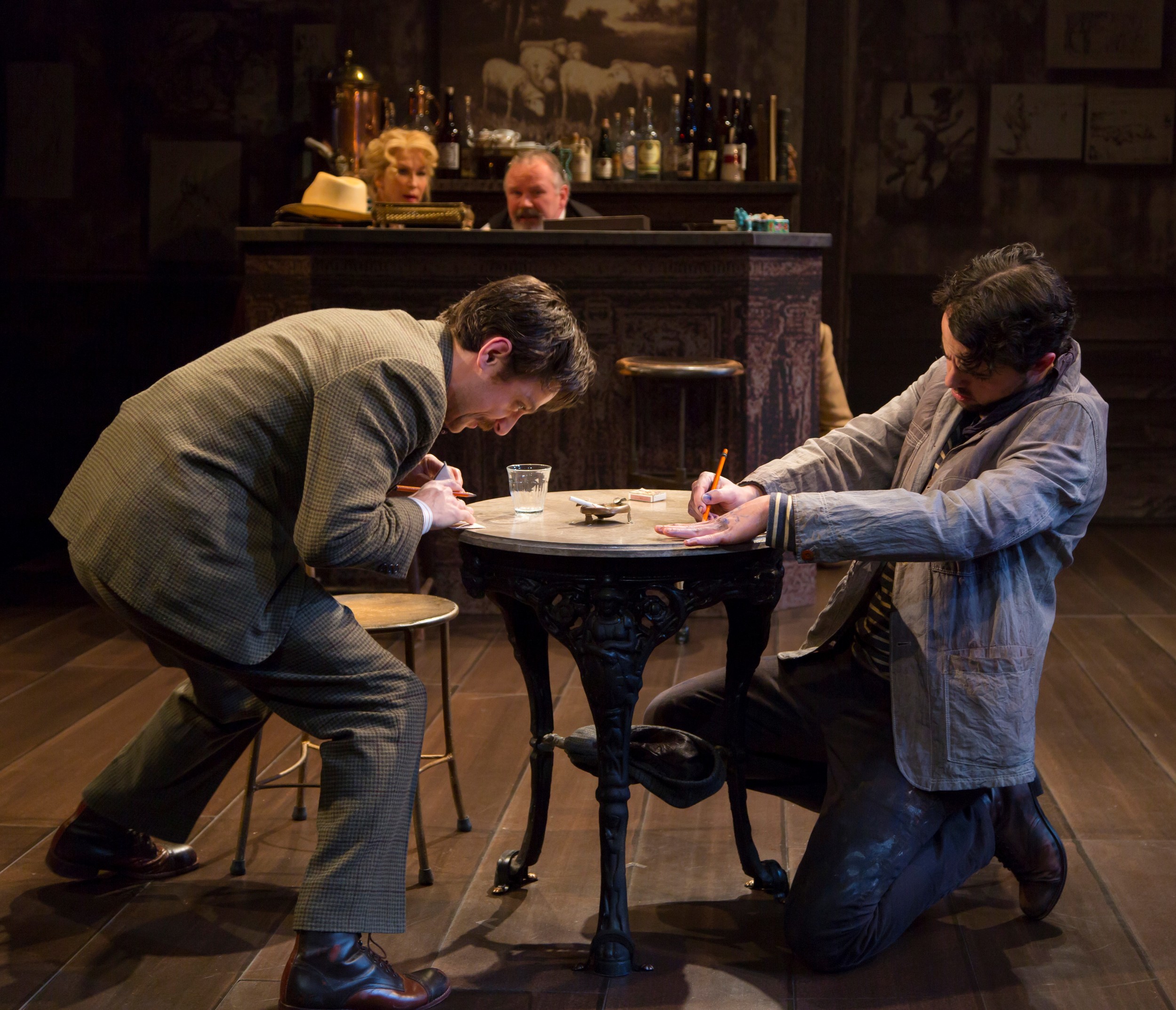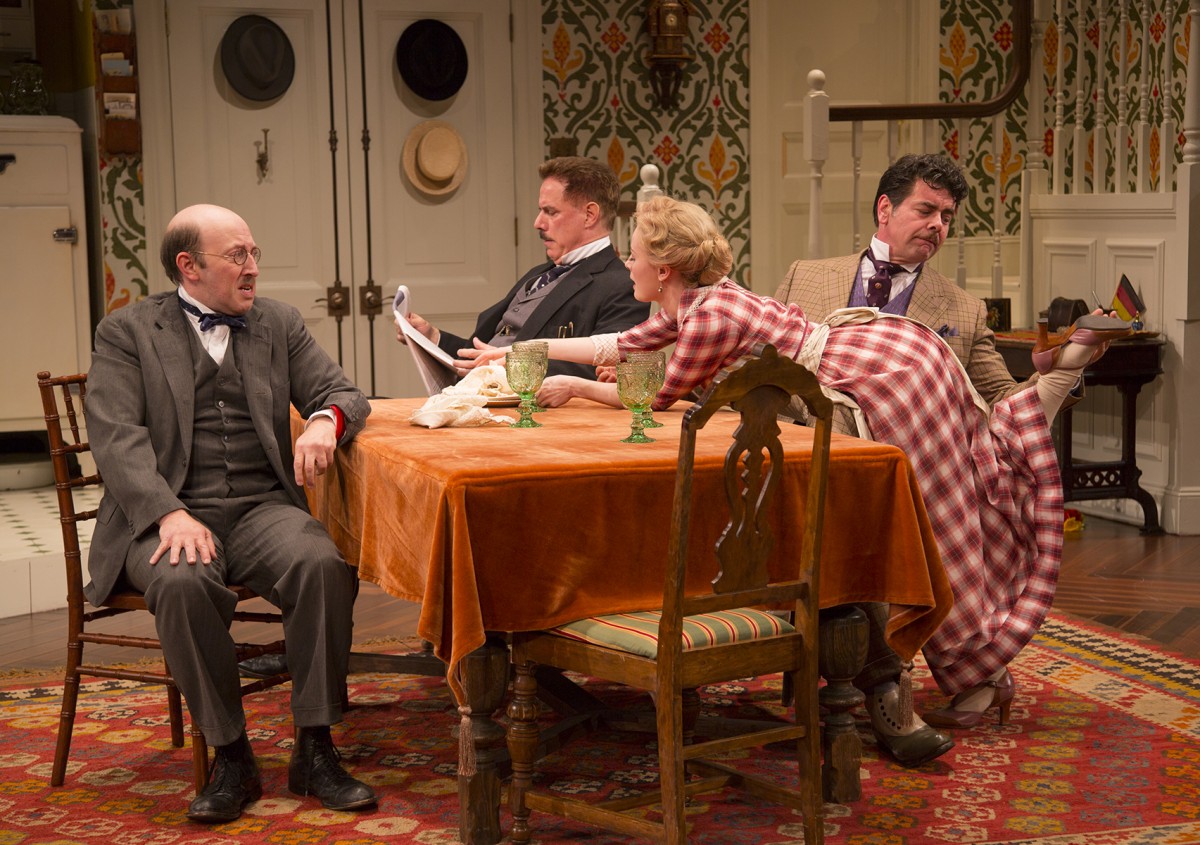Review of Picasso at the Lapin Agile at Long Wharf Theatre “So, a guy walks into a bar . . .” is a familiar opening of many jokes. In the case of the play currently showing at the Long Wharf Theatre, directed by Artistic Director Gorden Edelstein, it’s not just a bar—it’s the famous Lapin Agile in Paris in 1904; and it’s not just any guy—he’s the young Albert Einstein (Robbie Tann), and, what’s more, he has arrived onstage ahead of his cue, as the bar’s proprietor, Freddy (Tom Riis Farrell) eventually reminds him, snatching up a program from an audience member to show him he should arrive fourth and not third.
Steve Martin’s Picasso at the Lapin Agile is a playful play, but just when you think it's all tongue-in-cheek it gets cheeky enough to make a point. It fools about with the conventions of plays, and with famous men in the past—Picasso (Grayson DeJesus), of course, and Einstein—before they’re famous but when everyone is pretty much convinced they will be. It flings in comic disruptions—from a self-important inventor figure named Charles Dabernow Schmendiman (Jonathan Spivey) who is convinced he will be famous—and a genius-inflamed sexpot for each of the three, all played mercurially, and with fetching costumes, by Dina Shihabi, who put me in mind, pleasantly, of the late, great Madeline Kahn.
There’s also sport at the expense of Matisse (he’s not present though one of his paintings is), and amazement at Einstein's astoundingly quick mathematical calculations. There are witticisms and bad puns, and far too many bathroom breaks for Gaston (David Margulies, a great asset of this production), a bemused barfly who is on hand as a kind of ruminative witness to what would have been a legendary meeting. But don’t get too carried away by the stature of these imagined interlocutors. Aren’t avant-garde art and groundbreaking theory, Freddy’s consort Germaine (Penny Balfour) posits, simply a means to pick up girls?
Martin isn’t afraid to play it lowbrow with highbrow figures like Picasso and Einstein and that gives us a generally middlebrow evening, full of banter and comic grace notes. There are asides—from Schmendiman no less (who could be a bit more manic)—about the difference between talent and genius: “Talent sells a million a year, but genius sells five thousand a year for two hundred years!” And there are reflections on unsaleable subject matter in paintings (Jesus and sheep) from Picasso’s unflappable art dealer Sagot (Ronald Guttman), as well as a pithy takedown of Picasso’s womanizing ways by Germaine. There is even poetry, in the end, and moments reaching for symbolism, as in Suzanne (Dina Shihabi) describing Picasso with a pigeon, and, in Freddy’s punchline-less joke about a pie, a hint of Dada.
Though the talk isn’t always as vigorous as one might hope, the staging is all it can be. While not as inspired as last year’s Martin play at the Long Wharf, The Underpants, Picasso at the Lapin Agile is paced just about right. Additional help comes from a late arrival—Jake Silbermann as a Visitor from the future who adds to the group the “genius” of charisma.
The set, by Michael Yeargan, looks like the kind of place one wouldn’t mind hanging out in for a few drinks, and what’s more it’s period-appropriate and appealing in a bohemian way, flanked on either side by Impressionist-like nocturnes of the city that help sell the idea that Paris in 1904 should always look like it does in paintings. And at one point, as Einstein expounds upon his vision of the universe, the entire rear wall becomes a stellar field and what had seemed corporal melts into the vasty reaches of space. It’s a great effect and rather steals the thunder from a slide of Picasso’s Les Demoiselles d’Avignon, projected to suggest the leap of the Master’s imagination three years on.
Not that this is a contest, but Einstein does seem to carry the day in this encounter, having a more comic and engaging manner in Tann’s likeable performance and a more stylish and sophisticated female admirer (Shihabi again) than Picasso attracts here. When Martin runs out of gags, the play ends though not without some high and mighty projections about how these two worthies will remake the future. A toast to the twentieth century fourteen years after the century ended, and a decade and a century after the play’s setting, might cause us to feel a bit nostalgic for the ideas of art and the art of ideas as they circulated in the fertile modernist period. For all the comic chutzpah on display, Martin lets a certain melancholy into the mix with the notion that a genius’s grasp might coincide with his utmost reach only now and then. The secret, as every comedian knows, is in the timing, and that’s something Edelstein and company have a genius for.
Picasso at the Lapin Agile By Steve Martin Directed by Gordon Edelstein
Set Design: Michael Yeargan; Costume Design: Jess Goldstein; Lighting Design: Donald Holder; Sound Design: David Budries; Hair and Wig Designer: Leah Loukas; Dialect Designer: Amy Stoller; Movement Consultant: Tim Acito; Production Stage Manager: Rebecca C. Monroe; Assistant Stage Manager: Amy Patricia Stern; Casting: Calleri Casting; Photography: T. Charles Erickson
The Long Wharf Theatre November 26-December 21, 2014












